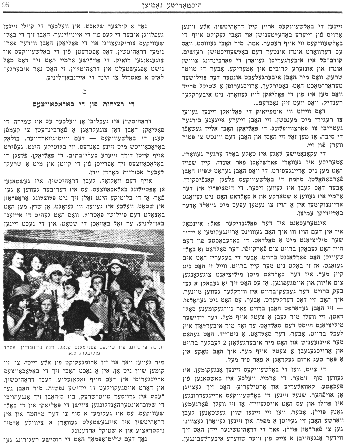
[ Page 95 ]
the Bolsheviks arrived in Drohitchin. Everyone came out of hiding and received the Russians as saviors. It is true that we knew what was to be expected under the Bolshevik regime. First of all, our contact with our relatives in the United States was cut off, but the fear of death that we experienced under the Polish regime caused us to feel happy about the fact that the Poles had left. Unfortunately, we didn't think much about what would happen afterwards.
This indicates how incapable the Poles were of governing. They led their own citizens to despair. The Poles were their own worst enemy, causing others to hate them and wanting to get rid of them.
The economic situation soon worsened considerably. The United States was closed to us, and no food aid came in. Whoever did have provisions hid them so they wouldn't be confiscated by the Bolsheviks. Life, however, was safe. Military discipline was very strict, and no soldier would dare to enter a house to forcibly take something or cause suffering to anyone.
The following story is rather interesting: one day a Jewish policeman and a soldier came to the house where I was living. The landlady was baking bread that she was going to sale. The soldier (a Bolshevik) asked for bread, but the lady baker told him that she wasn't baking any more bread because she didn't have any more flour. The soldier and the policeman went over to the oven and found bread inside, proving that was baking bread. The bread she was making was actually mine, and I told them so, but it did no good. They needed bread for newly arrived soldiers, and would give me a voucher for flour. The Jewish policeman told the soldier that he should leave me one loaf. The soldier, however, who was a gentile, was even more understanding and offered me two loaves, and also gave me a voucher for flour, which enabled me to obtain a couple of poods (80 lbs.) of flour a couple of days later.
The Bolsheviks had arrived at the end of the summer. The army, which was made up of infantry, cavalry and artillery, came through continuously. The Bolsheviks rapidly penetrated into Poland, and it became apparent that they would take over the whole country. However, when they got to Warsaw they suffered a defeat, and were forced to leave Poland. The situation of the Jews of Drohitchin again experienced tough times.
After a brief battle, in which bullets were flying over the heads of the residents, the Bolsheviks withdrew, and the Poles again took control of Drohitchin, and the withdrawal of the Russians took place quietly. This time the Polish army didn't stay in Drohitchin. They only left one unit to protect the railway.
XX.
The Bolshevik Murders
[Photo:] Chanukah party of Sheinka Feldman's class. Chana Greenstein, Esther Goldberg and others.
Drohitchin remained without any protection. The Poles then had an ally, the White Guards and Bulak Bolokhovitch and his gangs, in their fight against the Bolsheviks. These allies were led around like leashed dogs being led by their masters, the Poles, who let them off their leash to engage in brutal murders of Jews.
At the train station near Drohitchin there was a group of Bolokhovitch's gang, and there was a danger that the bloody hounds would suddenly be let loose in town, which was, as mentioned, defenseless. People paid the Polish unit that was guarding the railway to protect the town. At night we were protected and surrounded from all sides in case they tried to come to town. One night the Bolokhovitch gang broke into the Zakazelia Court near Drohitchin, and slaughtered 17 Jews. We lived in deathly fear until peace talks were held between the Poles and the Bolokhovitch gangs. The war came to a close, and a civilian administration was set up in Drohitchin, which brought some law and order.
After the peace agreement the Russian government
[ Page 96 ]
demanded that the Bolokhovitch gangs be interned, but the Polish government was slow to do it. In Drohitchin a group of the gangs remained for a couple of months. They were recognizable by their insignias that had a skull on it, and which they wore on their fur hats. After a while they underwent drilling and were taught the art of war. For us, however, they were no longer a danger, and looked like beaten down dogs. Finally, the Polish government acceded to the requests of the Moscow and interned the Bolokhovitch gangs.
[Photo:] A large demonstration in honor of the Balfour Declaration in Drohitchin on Lag Ba'Omer, 1919 [Sunday, May 18, 1919].
Previous Page
|
Next Page
JewishGen, Inc. makes no representations regarding the accuracy of
the translation. The reader may wish to refer to the original material
for verification.
JewishGen is not responsible for inaccuracies or omissions in the original work and cannot rewrite or edit the text to correct inaccuracies and/or omissions.
Our mission is to produce a translation of the original work and we cannot verify the accuracy of statements or alter facts cited.
 Drogichin, Belarus
Drogichin, Belarus
 Yizkor Book Project
Yizkor Book Project
 JewishGen Home Page
JewishGen Home Page
Copyright © 1999-2026 by JewishGen, Inc.
Updated 10 Dec 2001 by LA